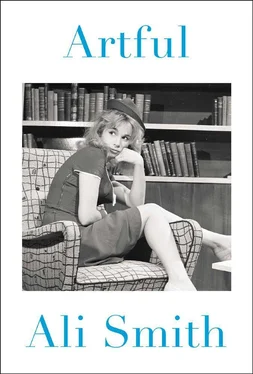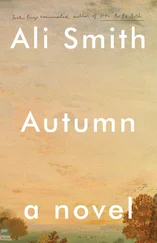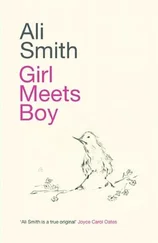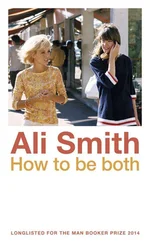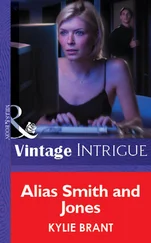The staple was rusty, which made me wonder about the damp status of the study at home. I looked at the way your writing sat next to the print of the photocopied text. It made me think about what writing was, seeing them together like that. It was very difficult to read, your writing — I mean, it had always been difficult, but had clearly become even more difficult at this point in your life, the point at which you’d been making these notes; I could see how it must have been painful to write.
Look at its curves, though, its lovely jerky slopes. Look at your y’s and your g’s. Look at the way you ran ing at the end of representing into a penciled line with no discernible letters in it at all. No one had handwriting like it. It could only be your hand.
I got up off the bed, I went over to the laptop and opened it, it glowed straightaway into life. I typed in the word Kusama. I looked back at your sleeping form, the trick of the dark.
A photo of a young woman with a paintbrush, standing waist deep in a river or a lake, came up on to the screen. Was she really trying literally to paint a river? A smudge of redness wisped away from her, disappearing into the water.
Then it struck me that maybe I could fill it in for you, the stuff you hadn’t had the chance to say about Cézanne, in the space you’d left under the word CÉZANNE.
I tried to remember what you’d ever said about him or his work. I knew we’d seen some of his paintings, and that you loved them. We’d stood in front of one of his pictures in a quiet gallery in a grand building in London, a place full of the most beautiful paintings and almost nobody but us there looking at them, and you’d told me the story about how Cézanne would slash and burn his own canvases in a fury, or when his child poked holes in them would exclaim with delight, look! he’s given it windows! he’s opened up the chimney!; how one day he threw something he was working on, a study of apples, out of the window of the top floor of his house and it landed in the branches of a fruit tree below, and he left it for weeks, till the day he looked up, saw it again and called to his son to go and get the ladder because it had ripened enough for him to work on it a bit more.
The painting we were standing in front of when you told me this, a painting of a lake and some trees, was so full of the color green that it’s almost all I remember about it, that greenness, though I remember you pointing out to me how everything in the picture was treated with the same importance or lack of importance, how every slab or flick of color mattered as much as every other, that that’s how the painting made its shapes, and how it mattered, too, that we knew it was a painting, something made, how Cézanne had wanted people who saw it to see how it was formed out of paint, made of color, made of surface, before they even thought about trees or a lake. That way, you said, the artifice was what made the place in the picture — as well as the picture — truly alive. That way, we knew that it was telling us no lies, it was not deluding us, it was real.
In the space under CÉZANNE, I wrote, instead, with my own handwriting next to yours:
I have been reading Charles Dickens’s novel Oliver Twist, I am halfway through it, roughly. (Oliver has just been shot in the arm, which is something I had totally forgotten happens.) I was interested to read in it so often about the color green. It is practically the first thing the Artful Dodger calls Oliver when he meets him, green, and ‘Greenland’ is where the Dodger tells the boys back at Fagin’s that Oliver’s come from, and the first thieving act that Oliver sees happen and then gets blamed for happens on The Green when Charley and the Dodger rob a man in a green coat, Mr. Brownlow, which suggests there is a relationship about knowing and not knowing between Mr. Brownlow and Oliver.
I put the hotel pencil down and went over to get Oliver Twist from the bedside cabinet. I flicked through it till I found the moment he and the Dodger meet.
‘Hullo, my covey! What’s the row?’ said this strange young gentleman to Oliver.
‘I am very hungry and tired,’ replied Oliver, the tears standing in his eyes as he spoke. ‘I have walked a long way. I have been walking these seven days.’
‘Walking for sivin days!’ said the young gentleman. ‘Oh, I see. Beak’s order, eh? But,’ he added, noticing Oliver’s look of surprise, ‘I suppose you don’t know what a beak is, my flash com-pan-i-on?’
Oliver mildly replied, that he had always heard a bird’s mouth described by the term in question.
‘My eyes, how green!’ exclaimed the young gentleman. ‘Why, a beak’s a madgst’rate; and when you walk by a beak’s order, it’s not straightforerd, but always a going up, and nivir a coming down agin. Was you never on the mill?’
It’s like literality meeting a metaphor, I thought. Or — no — it’s like a real apple meeting a Cézanne apple. It’s as if the Dodger speaks another language altogether; and it’s as if Oliver has to understand that a beak can be more than one thing, and a mill, and all the words that come in the paragraph after too, a stone jug, a magpie. Everything can be more than itself. Everything IS more than itself. When he understands that words are more than literal, then his own second name becomes the twist of his own story, one that can eventually deliver the right ending, the true identity to a lost and homeless boy. ‘We name our fondlings in alphabetical order. The last was a S, — Swubble, I named him. This was a T, — Twist, I named him .’ Oliver Twist, far from being named randomly, has actually been named according to the order of the materials that make language, the basis of the writing down of words.
My eyes! How green. I liked it that although I thought I knew this story, reading it again had become a finding of things I’d had no idea were in it. I liked how when he meets ‘the Artful,’ the book really comes alive, almost because he begins to understand about colorful language, and I liked how Dickens called the Dodger all his names, the Artful, the Dodger, the Artful Dodger, Jack Dawkins, Mr. John Dawkins, like he was a work of shifting possibility. I liked how the Artful Dodger’s cocked hat was always so unsafe on the top of his head but still stayed there anyway, never fell off, was all about balance. I liked how Fagin and the boys taught Oliver about theater — taught him their thievery by giving performances so funny that this boy, whose existence has been so pitiful, and who has done so much crying and trembling and swooning throughout the novel till then, sits laughing at their performances until the tears run out of his newly opened eyes.
I fell asleep at the hotel writing desk and when I woke up it was morning, the light was very bright out there in Brighton behind the window blind, and something fundamental in me must have altered overnight because I had pulled that blind up, had opened the window, had looked up at the sky, had washed my face, had had breakfast, had gone out into the air and had walked a length of the seafront before I even remembered that I had an old life, before it struck me again that I was alone.
The art of losing isn’t hard to master;
so many things seem filled with the intent
to be lost that their loss is no disaster.
Lose something every day. Accept the fluster
of lost door keys, the hour badly spent.
The art of losing isn’t hard to master.
Then practice losing farther, losing faster:
places, and names, and where it was you meant
to travel. None of these will bring disaster.
I lost my mother’s watch. And look! my last, or
Читать дальше
